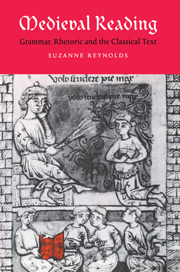Book contents
2 - Learning to read: the classics and the curriculum
from Part I - CONTEXTS FOR READING
Published online by Cambridge University Press: 22 September 2009
Summary
Postquam alphabetum didicerit et ceteris puerilibus rudimentis imbutus fuerit, Donatum et illud moralitatis compendium quod Catonis esse vulgus opinatur addiscat, et ab Ecgloga Theodoli transeat ad eglogas Bucolicorum, prelectis tamen quibusdam libellis informationi rudium necessariis. Deinde satiricos et ystoriographos legat, ut vitia etiam in minori etate addiscat esse fugienda et nobilia gesta eroum desideret imitari … Placuit tamen viris autenticis carmina amatoria [Ovidii] … subducenda esse a manibus adolescentium … Gramatice daturus operam audiat et legat Barbarismum Donati et Prisciani maius volumen cum Libro constructionum … Celestem paginam audire volens vir maturi pectoris, audiat tam Vetus Instrumentum quam Novum Testatmentum.
'After he has learnt the alphabet and been imbued with certain other boyish (puerilibus) rudiments, let him learn Donatus and that useful moral compendium which is generally believed to be the work of Cato, and from the Eclogues of Theodolus let him move on to the Bucolics [of Virgil], having first however read some shorter works which are necessary for the instruction of the unlearned. From here, let him read the satirists and the historiographers, so that at a young age he might learn that vices too are to be avoided and he might desire to imitate the noble deeds of heroes … However, certain men of authority hold that the love poetry [of Ovid] should be kept from the hands of adolescents … When he is about to undertake the study of grammar, let him hear and read the Barbarismus of Donatus along with the Priscianus maior, and Priscian's book on syntax … The man of mature understanding who wants to read the sacred text, should listen to both the Old and the New Testament.
Alexander Nequam, Sacerdos ad altare accessurus, end of the twelfth century.
- Type
- Chapter
- Information
- Medieval ReadingGrammar, Rhetoric and the Classical Text, pp. 7 - 16Publisher: Cambridge University PressPrint publication year: 1996



